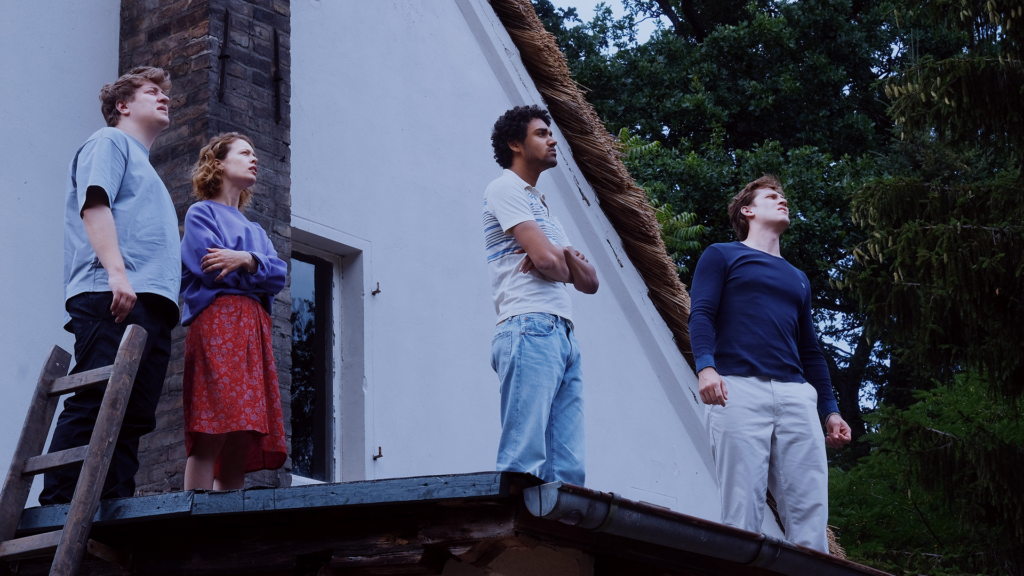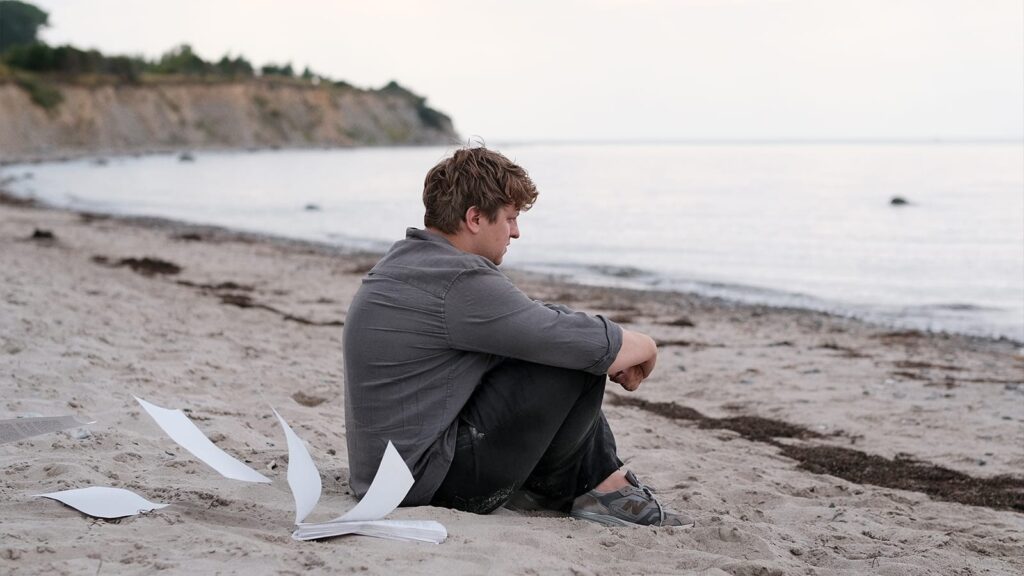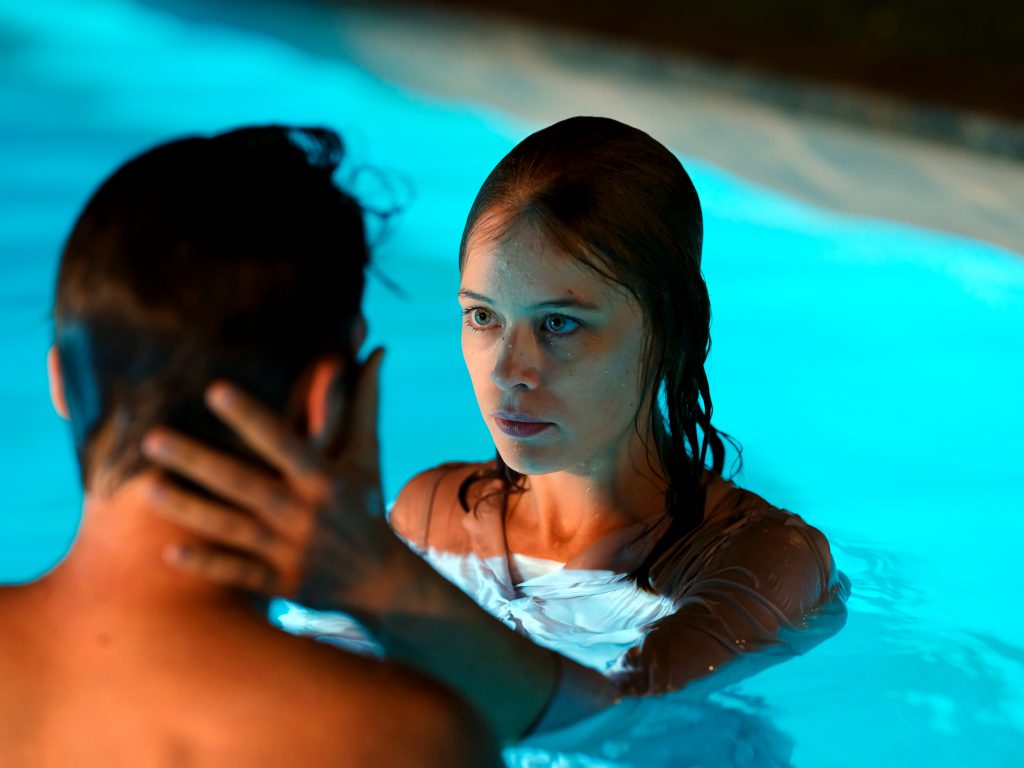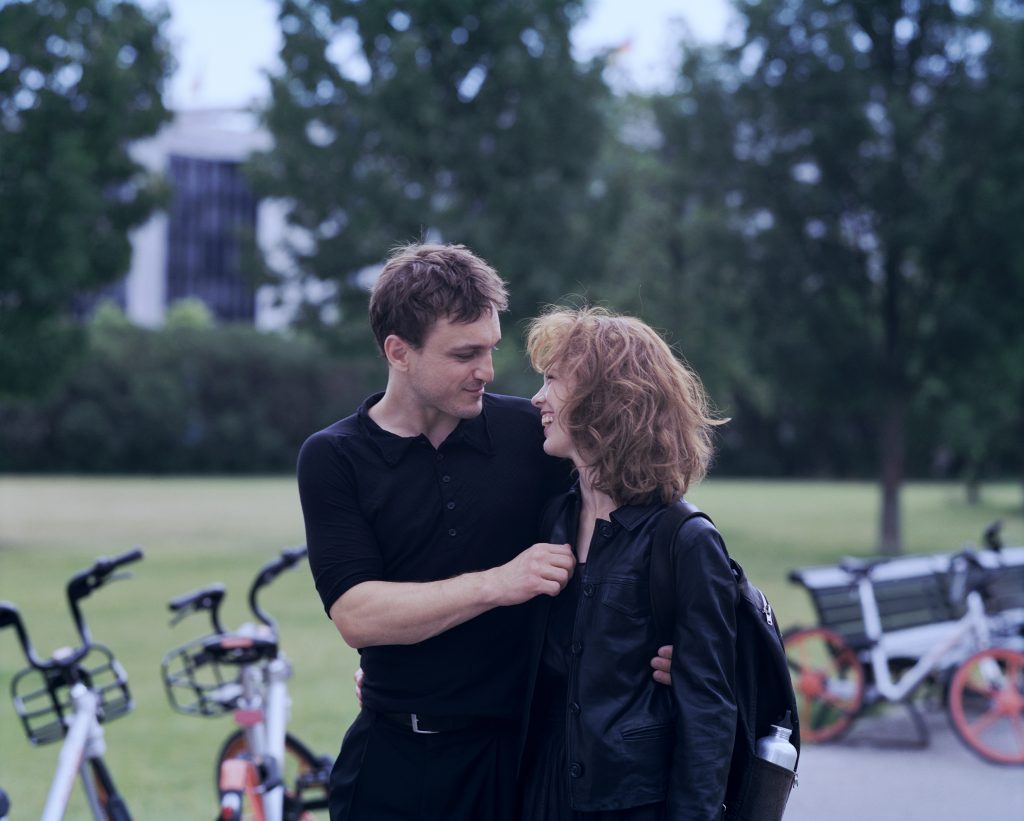August 28, 2023
by Carla Hay

Directed by Christian Petzold
German with subtitles
Culture Representation: Taking place in in Germany near the Baltic Sea, the dramatic film “Afire” features a nearly all-white cast of characters (with one black person) representing the working-class and middle-class.
Culture Clash: A book author with writer’s block and his photographer friend share a remote vacation house together and meet two strangers who alter their lives, as a forest fire is in danger of getting close to their house.
Culture Audience: “Afire” will appeal primarily to people who are interested in watching character-driven movies about blurred boundaries in relationships.

The moody and atmospheric drama “Afire” won’t captivate all viewers. However, this quietly intense film can find an appreciative audience with people who enjoy character studies where the cast members skillfully express spoken and unspoken dialogue. “Afire” also examines the repercussions and regrets of not expressing true emotions.
Written and directed by Christian Petzold, “Afire” had its world premiere at the 2023 Berlin International Film Festival, where it won the Silver Bear (second place) prize in the grand jury competition. The movie takes place in Germany, near the coast of the Baltic Sea. A beach property is the main location for the story. Although the movie has a relatively small number of people in its cast, “Afire” packs in some big emotions in the story.
“Afire” begins by showing book author Leon (played by Thomas Schubert) and his photographer friend Felix (played by Langston Uibel) traveling to the vacation house of Felix’s family. Felix’s father, who died six years earlier, used to own the house, which is now owned by Felix’s mother, who is never seen in the movie. It’s mentioned at some point in the movie that Felix and Leon are not only friends but they’ve also worked together on projects.
Leon (who is moody and standoffish) and Felix (who is friendly and outgoing) have very different outlooks to this getaway trip in this fairly remote area. Leon hopes that the isolated area will help him concentrate on finishing his upcoming novel, which he is calling “Club Sandwich.” Felix just wants to relax and have as much fun as possible.
There is a forest fire happening in the distance, but it’s not expected to get too close to the area where Leon and Felix are staying. The two friends experience a more immediate problem: Felix’s car runs out of gas, 12 kilometers away from the house, but they’re able to walk to the house with their luggage, with the assumption that the car can be dealt with later.
When Leon and Felix arrive at the house, it’s in disarray. The beds are unmade, and clothes are strewn everywhere. Felix then announces some news that Leon doesn’t want to hear: They won’t be living by themselves in this house. Felix explains that a Russian immigrant named Nadja will be staying there too.
Nadja is the niece of a coworker who works with Felix’s mother. Nadja is staying there as a favor because she’s working in the area by selling ice cream from an ice cream stand. Leon is slightly irritated when he finds out a third person will be living there. Leon insists on having his own room in this two-bedroom house so he can have peace and quiet to work on his book. The bedrooms are right next to each other.
Felix thinks that Nadja should have her own bedroom, while Leon and Felix can share the other bedroom. They both agree that either of them has the option to sleep on the living room couch if one of them needs the room all to himself at night, such as if an overnight guest is staying in the bedroom. Felix also suggests that if things get too noisy in the house, then Leon can always sleep under the pergola outside.
At first, Nadja (played by Paula Beer) is a mysterious presence who seems to come and go without any consistent schedule. She doesn’t have a car, so she travels by bicycle. Leon doesn’t meet Nadja until 24 minutes into this 102-minute movie. However, Leon is aware of Nadja’s presence long before he meets her in person. That’s because Nadja has been bringing a lover back to the house at night and loudly having sex with him.
The sex noises are loud enough that Leon can hear everything in the bedroom next door, so he tries to sleep on the living room couch, where he can still hear the commotion. Leon says out loud to himself, “I’m beginning to hate that woman.” And one night, when it happens again, he decides to sleep uncomfortably outside under the pergola. The next morning, he finds out that he has several bug bites.
Nadja’s lover is a local lifeguard who works at the nearest beach. His name is Devid (played by Enno Trebs), and he becomes a frequent guest at the house. When Leon and Nadja finally meet in person, they have an awkward but cordial conversation. She’s aware that Leon is annoyed by her loud sex noises interrupting his sleep, so she makes an apology and adds, “It won’t happen again.”
Although the first conversation between Leon and Nadja is uncomfortable for both of them, there is underlying sexual tension between them. Nadja and Devid have a casual, non-monogamous sexual relationship. Nadja does not want to describe Devid as her boyfriend, and they are not possessive of each other. Eventually, the sexual dynamics between Leon, Felix, Nadja and Devid start to change when it becomes obvious that Devid and Felix are sexually attracted to each other.
Leon has other worries besides whether or not Nadja finds him attractive. Leon’s book publisher Helmut (played by Matthias Brandt) is going to visit Leon at the house to read what Leon has written so far for Leon’s book manuscript. Apparently, Helmut and Leon don’t want to use email for this task. Leon is very apprehensive about this visit, because he’s afraid that Helmut won’t like what Leon has written so far.
“Afire” shows how all these tensions and fears permeate the interactions of the four people in this social group, especially with Leon, who has the movie’s main perspective. Leon doesn’t say it out loud, but he’s insecure about his physical appearance. His body language with Nadja indicates that he thinks she’s out of his league, when it comes to how physically attractive he is, so he overcompensates by trying to come across as a brooding and pompous intellectual.
As for the budding romance between Devid and Felix, it bothers Leon at first, because Leon apparently didn’t know that Felix is queer. By contrast, Nadja doesn’t seem bothered at all that Devid has become sexually interested in Felix. She shrugs it off as if it’s no big deal that Devid has lost interest in her sexually, and she acts as if her feelings aren’t hurt. This nonchalance intrigues Leon, who thinks there might be a chance that Nadja could develop an interest in Leon. Nadja is flirtatious with Leon but doesn’t give him much indication on which direction she wants to take her relationship with him.
“Afire” will keep viewers guessing on where the story is headed and what will happen to these characters. All of the cast members give good performances, but Schubert and Beer carry most of the emotional weight of the movie, since Leon and Nadja’s relationship anchors the story. It’s a movie that slowly sneaks up on viewers to deliver a stirring and poignant impact.
Sideshow and Janus Films released “Afire” in select U.S. cinemas on July 14, 2023.


